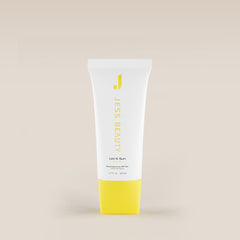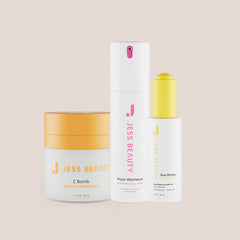Sunscreen is an essential step in any skincare routine, but many people with oily or acne-prone skin worry that using it may lead to breakouts. So, does sunscreen really cause acne? The answer isn’t that straightforward. While some products can contribute to clogged pores, the key lies in choosing the right formula for your skin type.
Can sunscreen cause acne?
Sunscreen itself is not a direct cause of acne, but certain ingredients can worsen breakouts in acne-prone skin. This usually happens when formulas contain comedogenic oils or pore-clogging components. According to the American Academy of Dermatology (AAD), individuals with oily skin should look for sunscreens labeled “non-comedogenic,” “oil-free,” and “broad-spectrum.”
Moreover, how sunscreen is applied also matters. If it’s not properly removed at the end of the day with a thorough cleansing routine, residue can mix with sebum and impurities, potentially leading to breakouts.
Types of sunscreens
There are two main types of sunscreens:
-
Mineral (Physical) Sunscreens: These contain ingredients like zinc oxide or titanium dioxide, which sit on the skin’s surface and reflect UV rays. They are ideal for sensitive and acne-prone skin due to their lower risk of irritation.
-
Chemical Sunscreens: Popular for their easy application, fast absorption, and residue-free finish, chemical sunscreens have a lightweight, fluid texture that makes them more comfortable to wear than mineral sunscreens. Their quick absorption also makes them a great choice for physical activity or swimming. Additionally, they don't leave a white cast, making them suitable for all skin tones.
How to choose the best sunscreen for oily and Acne-Prone Skin
If your skin is prone to acne, it’s crucial to look for a sunscreen with the following features:
✔ Oil-free: Helps reduce excess grease buildup.
✔ Lightweight texture: Prevents a heavy or sticky feel.
✔ Broad-spectrum protection: Shields against both UVA and UVB rays.
At Jess Beauty, we’ve developed formulas specifically designed for sensitive skin, featuring soothing ingredients and fragrance-free options. However, we always recommend consulting with your trusted dermatologist for personalized advice.
Benefits of sunscreen for Acne-Prone Skin
Far from being the enemy, the right sunscreen can actually help improve acne-prone skin:
-
Prevents hyperpigmentation: Post-acne marks can darken with sun exposure.
-
Protects against inflammation: UV radiation can irritate the skin and worsen redness.
-
Prevents premature aging: Unprotected sun exposure contributes to loss of elasticity and early wrinkles.
Common sunscreen mistakes
-
Not reapplying: Sunscreen protection doesn’t last all day; it should be reapplied every two hours, especially during direct sun exposure.
-
Using the wrong amount: It’s recommended to apply at least one teaspoon on the face and two fingers’ length on the neck.
-
Not removing it properly: If sunscreen isn’t removed at night, it can mix with impurities and cause breakouts.
-
Choosing the wrong formula: Using a greasy sunscreen can worsen oiliness and lead to clogged pores.
Sunscreen doesn't cause acne—but using the wrong formula can aggravate acne-prone skin. According to Medline, the solution lies in choosing the right products with lightweight textures and non-comedogenic ingredients. An effective cleansing routine is also essential to keep the skin protected and healthy.
If you have oily or acne-prone skin, there's no excuse to skip sunscreen. With the right options and proper application, you can keep your skin protected without the fear of breakouts.











